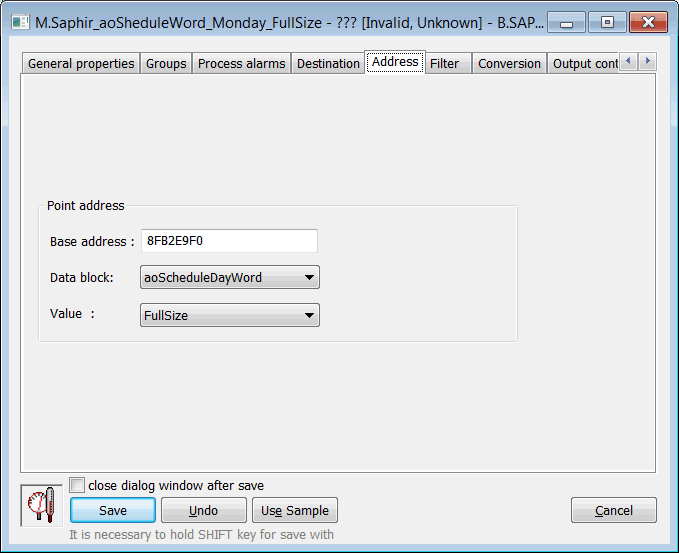Siemens SAPHIR communication protocol
Supported device types
Communication line configuration
Communication station configuration
I/O tag configuration
Literature
Changes and modifications
Document revisions
Supported device types
Siemens SAPHIR is used to configure and monitor the regulators of Saphir and Climatix product lines produced by Siemens. Supported regulators: Saphir ACX32/ACX34 (via TCP/IP as well as via serial interface) and Climatix POL63x (specifically POL638 via TCP/IP).
Communication line configuration
- Communication line category: TCP/IP, TCP/IP-TCP Redundant
Note: a reserved TCP port 4242 is usually used, but any other port can be configured, depending on the settings of communicating device. Line number is not used, it can be set e.g. to 1. - Communication line category: Serial and SerialOverUDP Device Redundant (serial communication)
Note: serial communication was tested only with Saphir ACX32 regulator via its serial port.
Communication station configuration
- Communication protocol "Siemens SAPHIR".
Station protocol parameters
Dialog window for station configuration - Protocol parameters.
They influence some optional parameters of protocol. Following line protocol parameters can be entered:
Table 1
| Parameter | Meaning | Unit | Default value |
|---|---|---|---|
Full Debug | Logging is enhanced with listings that enables fast error detection. | NO | |
Type of Device | Type of used regulator. | ACX32 | |
Retry Count | Maximum number of request retries in case of communication error. | 2 | |
Retry Timeout | A delay before resending a request in case of communication error. | s | 0,1 |
Wait First Timeout | Timeout between sending a request and first reading of a response. | s | 0,1 |
Wait Timeout | Delay between reading the responses. | s | 0,1 |
Max. Wait Retry | Maximum number of retries of reading the response. | - | 20 |
I/O tag configuration
Possible value types: Ai, Ao, Ci, Co, Di, Dout, TxtI, TxtO, TiA, TiR.
I/O tag address
In Siemens Saphir the I/O tag address is defined as a combination of "Base address", "Data block" and particular element in given data block.
"Base address" is 32-bit number that uses hexadecimal format.
"Data block" is a type of data block located on specified base address. Current implementation supports these data blocks:
- Message
- MessageEx
- SetPointReal
- SetPointEnum
- LoopSetPoint
- MeasureEx
- SystemClock
- Diagnostic
- SwitchCommand
- LoopController
- PositioningCommand
- MBusCounter
- Counter
- AlarmList
- AlarmEntry
- RCC_Config
- UnitConfig
- TimePlanEnumV2_Day
- TimePlanEnumV2_Week
- HeatingCurve
- aoAlarm
- aoAlarmEntry
- aoDiagnostic
- aoSetptValue
- aoCurveCalc
- aoAnalogInput
- aoBinaryInput
- aoMultistateValue
- aoLoopController
- aoAnalogValue
- aoScheduleWord
- aoScheduleDayWord
- PosCommandEx
- DeviceGroup
- aoDevice
Each data block is N-tuple (different for every type of data block) of primitive data types. Supported primitive types:
- Boolean
- Word
- Unsigned Long
- Long
- Access
- Float
- String
- Integer
- Date
- Time
- Wnday
Literature
Changes and modifications
-
Document revisions
- Ver. 1.0 - May 28, 2015 - creation of document
- Ver. 1.1 - July 2, 2015 - implementation of data blocks DeviceGroup and aoDevice
Related pages:

Pridať komentár